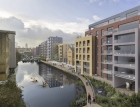Shenton Group supplies CHP to housing project

Shenton Group has won a contract to install its recently launched Tedom Centro T100 CHP system into the Kingsland Wharves housing development in London against competition from five other companies. The order also includes a Tedom Micro T30 CHP system. The two systems will supply heat and electricity to 207 dwellings in nine blocks. The T100 unit, installed in a purpose-built underground plant room, will also serve a surgery in one block, an artist’s studio and several commercial units across the project.
The development comprises new apartment buildings around the historic Kingsland canal basin on the Regent’s Canal in East London. The scheme has been developed to comply with environmental requirements, including BREEAM and local building-efficiency codes.
Centro T100 units are fuelled by natural gas and have a maximum electrical output of 101 kW, 400 V, 3-phase and a maximum hot-water output of 147 kW at 90°C.
Micro T30 units also use natural gas. They have a maximum electrical output of 30 kW, 400 V, 3-phase and a maximum hot-water output of 62 kW at 90°C.
The two units for this project will be maintained under Shenton Group’s Infinium24 programme that constantly renovates and re-engineers components before their projected replacement date.
These CHP units were installed for Imtech Aqua Services.








